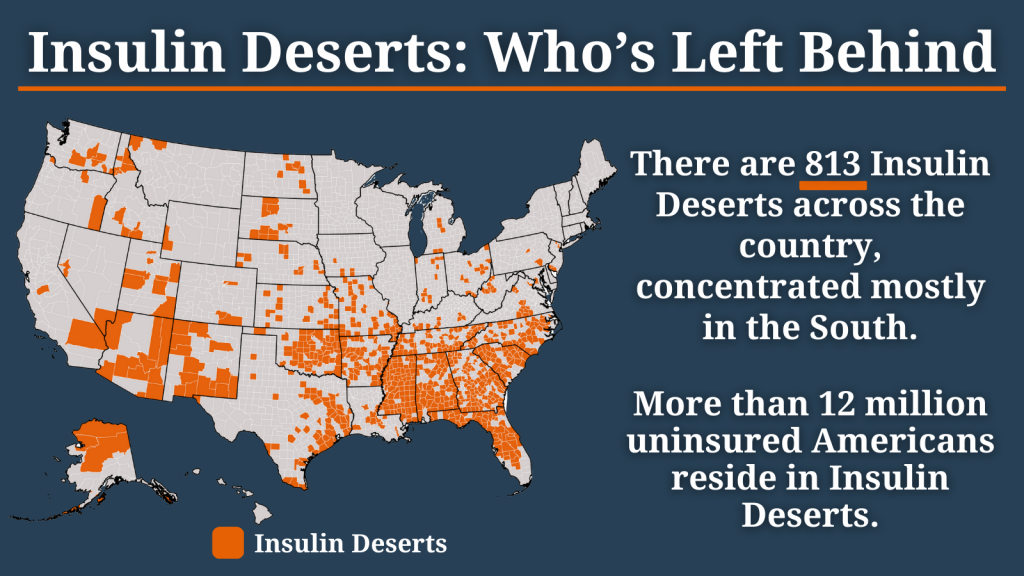Today, Senators Reverend Warnock, Kennedy released a new white paper illustrating the need for a federal law to lower high insulin costs
The new report analyzes county-level data across the country to examine counties with both high rates of uninsured people and high rates of diabetes – which the Senators have termed “Insulin Deserts”
This white paper is the first published report that looks at counties with both a high uninsured population and high prevalence of diabetes, analyzes why these Americans remain vulnerable despite state and federal progress on reducing the cost of insulin
Senator Reverend Warnock: “This alarming report makes clear who will be left behind if Congress fails to pass my $35 insulin cost cap, including uninsured Georgians who live in the 105 counties considered insulin deserts”
Senator Kennedy: “By capping prices at $35 for every patient, we can help lower future health care costs associated with complications that arise from untreated diabetes”
ICYMI from USA Today: More than 800 U.S. counties are ‘insulin deserts.’ How these senators want to help Americans with diabetes

Above is a map of the 813 counties that are Insulin Deserts – counties in the top half of the country by both uninsured rates and diabetes prevalence
Washington, D.C. – Today, on World Diabetes Day, U.S. Senators Reverend Raphael Warnock (D-GA) and John Kennedy (R-LA) released a new white paper illustrating the need for a federal law to lower high insulin costs. The new report analyzes county-level data across the country to examine counties with both high rates of uninsured people and high rates of diabetes – which the Senators have termed “Insulin Deserts.”
The report finds that 813 counties—just over a quarter of the nation’s counties—are Insulin Deserts, and most of these counties are concentrated in the South and especially the southeast, exacerbating poor health outcomes across the region. This white paper is the first published report that analyzes both counties with high rates of uninsured people and high rates of diabetes, as well as why Americans in these communities remain vulnerable despite state and federal progress on reducing the cost of insulin.
“This alarming report makes clear who will be left behind if Congress fails to pass my $35 insulin cost cap, including uninsured Georgians who live in the 105 counties considered insulin deserts” said Senator Reverend Warnock. “There’s good news though: my bipartisan legislation with Senator Kennedy would ensure that uninsured folks, especially folks in insulin deserts, are able to afford their insulin by capping their cost at $35 a month.”
“The cost of insulin is rising for too many Louisianians who rely on it just to survive,” said Senator Kennedy. “I’m grateful to work with Sen. Warnock to issue this bipartisan report, which details the need for Congress to pass our Affordable Insulin Now Act. By capping prices at $35 for every patient, we can help lower future health care costs associated with complications that arise from untreated diabetes.”
The original analysis on Insulin Deserts finds that:
- As many as 2.75 million Americans, including those with private insurance and the uninsured, do not have federal protections against high insulin costs
- Uninsured Americans in Insulin Deserts are more likely to fall under the federal poverty line, and less likely to have access to sufficient internet than uninsured Americans in non-Deserts–making it difficult for them to access insulin manufacturer patient assistance programs
- Uninsured Americans in Insulin Deserts are also less likely to be college graduates than uninsured Americans in non-deserts
- Uninsured Americans in Insulin Deserts are also more likely to be people of color than uninsured Americans in non-Deserts
“Senators Warnock and Kennedy’s report demonstrates the imperative to ensure everyone has access to the insulin they need, regardless of insurance status,” said Director of Public Citizen’s Access to Medicines Program Peter Maybarduk. “Public Citizen is grateful for the tireless efforts of Sens. Warnock and Kennedy and their staff to make sure hundreds of thousands of people without insurance who need insulin to live are not left behind.”
The findings in this new report detail how uninsured Americans, especially in areas with high rates of diabetes and high uninsured rates, face obstacles to navigating already complex patience assistance programs—and how millions of Americans, particularly the uninsured, are being left behind by the exorbitant costs of insulin. Senators Warnock and Kennedy are leading the bipartisan charge in the Senate to pass a $35 universal insulin cost cap, and this new white paper makes a compelling case for why federal legislation is urgently needed to address the crisis illustrated by these Insulin Deserts, so insured and uninsured patients alike have access to affordable insulin.
###